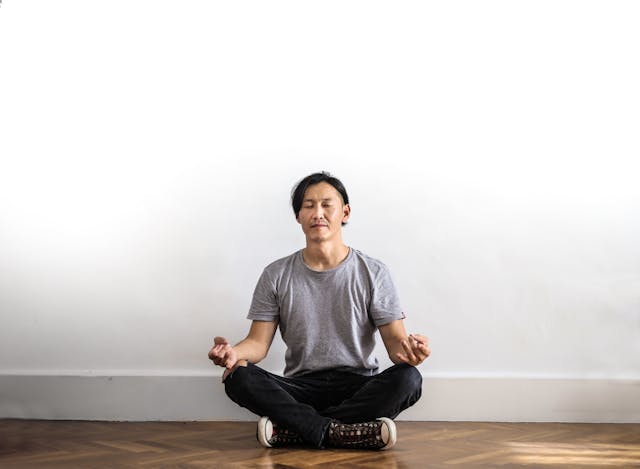

In today’s fast-paced world, finding moments of calm and tranquillity among the commotion might seem like a pipe dream. However, mindfulness provides a method to reconnect with the present moment and cultivate a feeling of well-being. Mindfulness is essentially the discipline of paying attention to the present moment with openness, wonder, and acceptance. It entails intentionally focusing awareness to ideas, emotions, physiological sensations, and surrounds without judgment. Mindfulness promotes a stronger feeling of presence and clarity by allowing us to focus on the now.

Numerous research have shown that mindfulness improves physical, mental, and emotional well-being. Regular practice has been related to lower stress, anxiety, and depression levels, as well as better sleep quality and general mood. Mindfulness also improves cognitive function, attention, and decision-making abilities, resulting in increased concentration and productivity in everyday chores. It also promotes self-awareness and compassion, which strengthens our connection to ourselves and others.
Practical techniques might help you incorporate mindfulness into your everyday life. Starting with the breath acts as an anchor, focusing attention on the feeling of breath entering and exiting the body. Throughout the day, attentive awareness may be practiced by observing sights, sounds, and feelings without judgment. Mindful movement methods like yoga and walking meditation improve physical strength, flexibility, and present moment awareness. Cultivating thankfulness turns the emphasis from lack to appreciation, promoting a good attitude about life. Finally, being nice to oneself is acknowledging the whole range of human experience with tenderness and understanding.
Aside from its intrinsic advantages, mindfulness provides a significant chance for personal development and self-discovery. Mindfulness practice allows people to have a better understanding of their thoughts, feelings, and actions, resulting in increased self-awareness and emotional intelligence. Individuals may develop a nonjudgmental attitude toward their inner experiences, allowing them to react to life’s obstacles with more clarity, resilience, and compassion.
Furthermore, mindfulness goes beyond individual well-being to promote stronger connections and empathy in relationships. Individuals may interact more completely with others by developing present moment awareness and deep listening abilities, which build real connections and supportive partnerships. Mindful communication techniques, such as active listening and speaking with purpose, may improve comprehension and harmony in interpersonal relationships.
In addition to interpersonal advantages, mindfulness has been demonstrated to improve workplace performance and culture. Mindfulness may improve productivity, decision-making, and leadership effectiveness by encouraging increased attention, creativity, and emotional control. Furthermore, introducing mindfulness techniques into the workplace may foster a more inclusive and supportive atmosphere, lowering stress and boosting employee well-being.
As mindfulness gains recognized for its significant influence on health, relationships, and employment, it is being integrated into more parts of society. Mindfulness programs are being used to enhance well-being and resilience in a variety of contexts, including schools, healthcare facilities, organizations, and communities. Individuals and groups that practice mindfulness may foster more calm, presence, and purpose in an increasingly complicated world.

Mindfulness practice is especially important at times of uncertainty and tragedy, such as the worldwide epidemic. Mindfulness provides a safe haven among the storm, anchoring you in the present moment when all else seems uncertain. Individuals who practice mindfulness may face difficult situations with better resilience, clarity, and compassion.
It’s normal to feel more stressed, anxious, and afraid during a crisis. Mindfulness, on the other hand, provides a method for dealing with challenging emotions via presence and acceptance rather than resistance or avoidance. By listening to our inner experiences with love and inquiry, we may get a more balanced perspective on our problems and create inner resources for coping and adapting.
Furthermore, mindfulness may help people develop a feeling of community and connection, even when they are physically separated from others. Individuals may join virtual mindfulness practices and online groups to share their experiences, give support, and build a feeling of belonging. In this approach, mindfulness is an effective technique for fostering resilience and social cohesiveness during times of stress.
In addition to its individual and interpersonal advantages, mindfulness has the capacity to spark good change on a broader scale. Mindfulness, by encouraging increased awareness and compassion, may motivate collective action toward a more equitable, sustainable, and caring society. From grassroots movements to worldwide efforts, mindfulness is bringing about dramatic change in society, one present moment at a time.
As we face the problems of today’s world, let us embrace mindfulness as a source of hope and resilience. We may handle uncertainty with grace and bravery if we cultivate present moment awareness and a compassionate attitude. Let us use the power of mindfulness to build a better future for ourselves and future generations.

One of the most appealing qualities of mindfulness is its flexibility to adapt to many areas of everyday living. Mindfulness is not restricted to formal meditation practices; it may be smoothly incorporated into daily activities, converting routine moments into chances for present and awareness.
Consider introducing mindfulness into ordinary activities like dishwashing, walking, or dining. Instead of racing through these tasks, focus your complete attention on the sensory experience unfolding in the present now. Consider the warmth of the water on your hands as you wash dishes, the feeling of your feet touching the ground as you walk, or the smells and textures of the food as you eat. Engaging all of your senses may help you develop a greater appreciation for life’s basic pleasures.
Furthermore, mindfulness may be used to address difficult events or emotions that come during the day. When feeling stressed, anxious, or frustrated, take a minute to stop and reconnect with your breath. Notice any feelings of tension or discomfort in your body and show yourself love and kindness. Acknowledging your experience without judgment allows for increased clarity and perseverance in the face of hardship.
Incorporating mindfulness into communication is another effective method to strengthen connections and understanding in relationships. Practice active listening by paying whole attention to the speaker without interrupting or formulating your answer. Be open and curious about the other person’s words, tone, and body language. By building presence and empathy in interactions, you may create deeper relationships and improve mutual understanding.
In essence, mindfulness is a way of life that may add significance, pleasure, and connection to every area of our existence, rather than a distinct practice designated for unique periods of silence. By adopting mindfulness as a way of life, we may turn ordinary situations into remarkable possibilities for development and enlightenment.
Disclaimer: This content is for informational purposes only and is not intended as medical advice, diagnosis, or treatment. Always seek the advice of your physician or other qualified health provider with any questions you may have regarding a medical condition.

Sign up for our newsletter to receive the latest recipes and health tips, meticulously reviewed to align with the most recent nutritional science.
Copyright © 2024 Health Recipe Club
Our content is intended for informational purposes only and should be used in conjunction with professional medical advice. Recipes and health tips are regularly reviewed to reflect current nutritional understanding, aiming to integrate healthy eating into a joyful lifestyle.